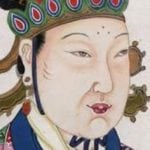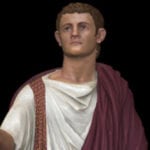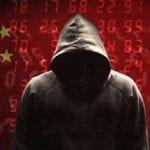 Weird Stuff
Weird Stuff  Weird Stuff
Weird Stuff  Mysteries
Mysteries 10 Chilling Accounts of Disappearances in Everglades National Park
 History
History The 10 Weirdest Wars in History
 Movies and TV
Movies and TV 10 Directors Who Made the Same Film Twice
 Gaming
Gaming 10 Strangest Video Game Tie-Ins for Famous Musicians
 Creepy
Creepy 10 Creepy Rituals Hidden in Ancient Burials
 The Arts
The Arts The 10 Most Pioneering Yet Polarizing Premieres in Classical Music
 Travel
Travel 10 Countries Where You Can Live in Luxury for Cheap
 Crime
Crime 10 Cases of Mothers Slain by Their Own Children on Mother’s Day
 Humans
Humans 10 Extremely Simple Concepts That Completely Changed the World
 Weird Stuff
Weird Stuff Ten Bizarre and Hilarious Units of Measurement
 Mysteries
Mysteries 10 Chilling Accounts of Disappearances in Everglades National Park
 History
History The 10 Weirdest Wars in History
Who's Behind Listverse?

Jamie Frater
Head Editor
Jamie founded Listverse due to an insatiable desire to share fascinating, obscure, and bizarre facts. He has been a guest speaker on numerous national radio and television stations and is a five time published author.
More About Us Movies and TV
Movies and TV 10 Directors Who Made the Same Film Twice
 Gaming
Gaming 10 Strangest Video Game Tie-Ins for Famous Musicians
 Creepy
Creepy 10 Creepy Rituals Hidden in Ancient Burials
 The Arts
The Arts The 10 Most Pioneering Yet Polarizing Premieres in Classical Music
 Travel
Travel 10 Countries Where You Can Live in Luxury for Cheap
 Crime
Crime 10 Cases of Mothers Slain by Their Own Children on Mother’s Day
 Humans
Humans 10 Extremely Simple Concepts That Completely Changed the World
10 Bizarre Tales Of The First Emperor Of China’s Quest For Immortality
Qin Shi Huang was a ruler unlike any the world had ever seen. He rose his armies against every kingdom around him and conquered them all. He became the first emperor of a united China, and he left his mark on the world. He started the Great Wall, built the Terracotta Warriors, and left behind a legacy unlike any before.
No one had ever taken as much from life as Qin Shi Huang —and the thought of losing it terrified him. No matter how many armies he conquered, the specter of death still followed after him. He saw, ever in wait, the inescapability of his own mortality. He refused to accept it. After conquering China, the first Emperor waged a new war against death itself.
10He Had All Scholars Focus on Making an Elixir of Immortality
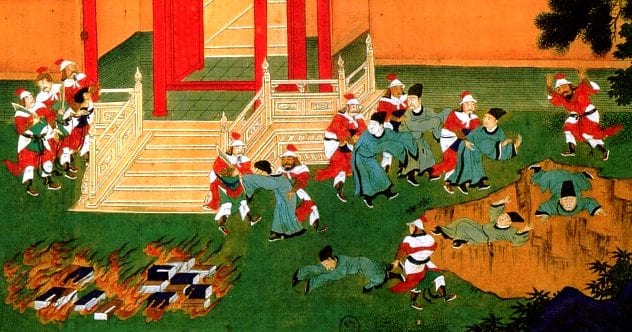
Qin Shi Huang feared that the people would rebel against him. If they learned about the past, he believed, they might long for a different time—and so he had every book of history, poetry, and philosophy gathered up and burned.
Some believe, though, that this was about more than controlling the people. Qin Shi Huang wanted every wise mind in China working on one thing: the secret of immortality. After all, he could not have strong minds wasting time on poetry when they could be helping him cheat death.
He had several alchemists put to work developing the elixir of immortality, but that, of course, was an impossible task. When two alchemists admitted they could not do it, Qin Shi Huang became furious. Every intellectual, he ordered, must suffer.
For failing to make him immortal, Qin Shi Huang had 460 scholars buried alive. These men, Qin Shi Huang declared, claimed to be sorcerers. If they really had magic powers, then they could bring themselves back to life.
9He Sent 6000 Virgins off to Find the Mountains of Heaven
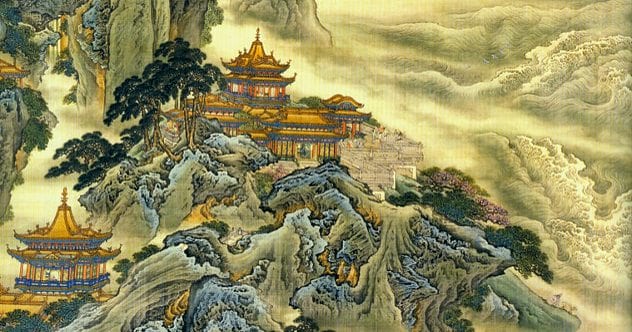
As his scholars had failed him, Qin Shi Huang traveled to Zhifu Island, where he had heard that a man could find the secret to eternal life. There he met the magician Xu Fu, who assured him that it could be done.
Xu Fu promised him that the elixir of immortality was waiting for him on Penglai Mountain. This was not a real place—it was the mythical home of the Eight Immortals, and a pathway to the gods. Here, Xu Fu told the emperor, lived a 1,000-year-old magician named Anqi Sheng who would share the secret.
Qin Shi Huang was pleased. He gave Xu Fu a fleet of ships and let him sail out in search of the elixir of immortality. And, soon, Xu Fu returned, insisting that he had found it. The island of the immortals, Xu Fu said, was full of grass that would give the emperor eternal life—but the immortals demanded a sacrifice. He needed to bring 6,000 virgins to get the elixir.
Qin Shi Huang believed him, and he gave him what he needed. For the next eight years, Xu Fu did not go anywhere near the emperor—he just sailed around the sea with 6,000 virgins, while Qin Shi Huang patiently awaited an elixir that would never come.
As mystical as the story sounds, there is evidence that suggests it is true. On Zhifu Island, Qin Shi Huang etched the words, “Arrive at Fu and carved the stone”—an engraving that is still there today.
8He Forbid Anyone from Using First-Person Pronouns
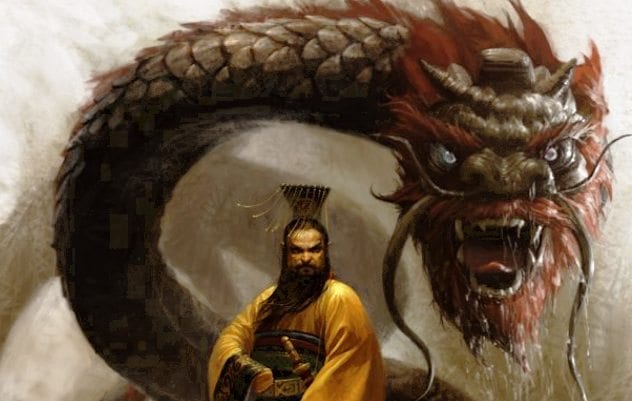
Qin Shi Huang was convinced that he was going to become an immortal god. He even labeled himself one. After uniting China, he threw away the old title of “king” and took a new one: “huangdi.” It is a word we usually translate to “emperor,” but that is not quite accurate—it really means “god.”
He also made it law that, from now on, no one could use the first-person pronoun “zhen.” Now that all kings had bowed down before him, he declared, no one else could refer to themselves with a term that conferred respect. From now on, every Chinese citizen would have to refer to themselves with the word “wo,” a word that, at the time, meant, “this worthless body.”
After Xu Fu had promised him immortality, though, even Qin Shi Huang stopped using the word “zhen.” Now, he declared, he must be called “The True Man”—a title that told the world that he had become immortal.
7He Made Decoys Ride in His Carriage
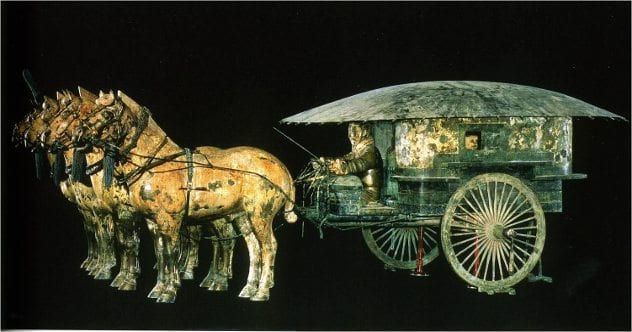
To become immortal, though, Qin Shi Huang would have to stay alive until Xu Fu came back. This was not a sure thing. There had already been many attempts on his life, and he had made many enemies on the path to becoming emperor. He lived in fear of his own death at every moment—and so, when he traveled, he started putting a decoy in his royal carriage.
It ended up saving his life. A man named Zhang Liang was plotting his death. Zhang Liang was a man destined to become the chancellor to the Han king until Qin Shi Huang conquered the Han kingdom and reduced its nobles to nothing. Zhang Liang wanted revenge.
He teamed up with China’s strongest man, Gan Ba, who dragged a 160 lb (72.5 kg) hammer up to the top of a hill and waited for Qin Shi Huang to pass by. When the royal carriages came close, Gan Ba hurled the massive hammer at the royal carriage. The massive iron weight shattered it into pieces and killed everyone inside.
Qin Shi Huang, though, wasn’t inside. He was behind it, in an undecorated carriage that looked to be made for a commoner. His guards rushed into action, but Gan Ba tackled them head on, giving up his own life so that Zhang Liang could escape.
6He Travelled through a System of Tunnels to Avoid Going Outside
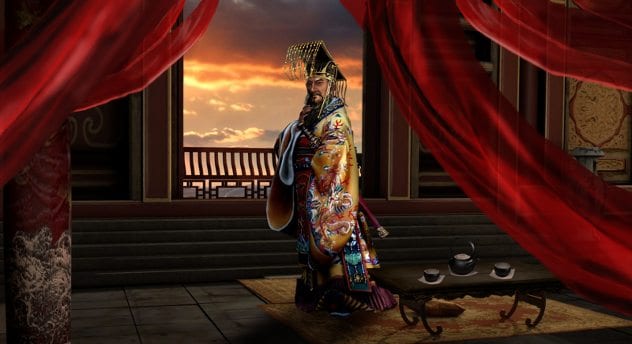
In his later years, Qin Shi Huang stopped going outside altogether. Unless it was absolutely necessary, he would no longer risk stepping out into the open air. Instead, he had a system of tunnels and underground pathways set up at his castle to make sure he never had to go outside.
He lived in a massive complex that was more than a third of a mile long—in its time, one of the biggest in the world. It held a massive palace surrounded by ten buildings, connected through walkways. These were majestic, heavenly things. One was an elevated walkway that crossed over a river, designed to look like the Milky Way shining in the sky.
In part, he was afraid of assassins, but it was more than that. Death itself was outside waiting for him, Qin Shi Huang believed. He stayed inside of his castles and his tunnels so that he could not be seen by the dark spirits that were searching for him.
5A Meteor Fell to the Earth Prophesising His Death
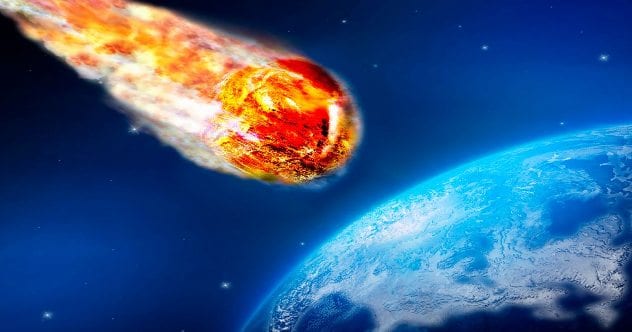
One year before the emperor died, a meteor fell to the earth. On its own, this could have been seen as an omen, but this was more than just a rock. On the rock that fell from the sky were inscribed the words: “The First August Emperor will die and his land will be divided.”
The Emperor was a superstitious man, but even he did not think the message was really engraved by the gods. He was sure that somebody had carved the rock after it landed, and he wanted to know who. He demanded that the person responsible confess, or everyone would pay.
When no one came forward, he had ever single person who lived near the place where the meteor landed rounded up, thrown in prison, and executed. He even had his men get the meteor itself and destroy it in a fire.
Even then, though, it still bothered him. Reportedly, after giving the order to kill every person there, he called in his musicians and had them play him songs about his immortality.
4He Fought a Sea Monster for Immortality
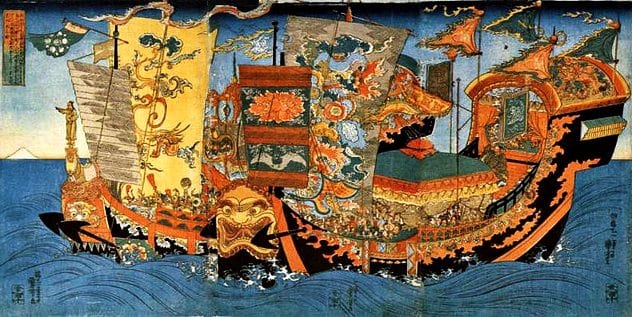
After the meteor landed, Qin Shi Huang grew impatient. He sailed off to Zhifu Island once more to find Xu Fu, the magician who had promised him an elixir of immortality.
Xu Fu assured him that he had found Penglai Mountain. Now, though, the path was blocked by a great sea monster, and he had no way to get through. This time, though, Qin Shi Huang would not wait around any longer. He would get a team of archers, he told Xu Fu, and kill the sea monster. This time, Xu Fu was not going to be trusted to go alone. The emperor was coming with them.
Qin Shi Huang and his team of archers sailed into the water, where the found a massive fish they believed to be a sea monster—which, today, is believed to have been a whale. The archers opened fire and killed it. When it was done, Qin Shi Huang returned to Zhifu Island and left a message that is still there today: “Came to Fu, saw enormous stone, and shot a fish.”
Xu Fu didn’t have any excuses left. He was to get the elixir from the immortals, Qin Shi Huang ordered, and return immediately, or else he would face the consequences.
Xu Fu assured the emperor he would do it. Then he gathered up his 6,000 virgins, put them in his ships, and sailed off—and never came back. With no way to keep the act up, he fled to Japan and spent the rest of his life in hiding.
3He Poisoned Himself with Mercury
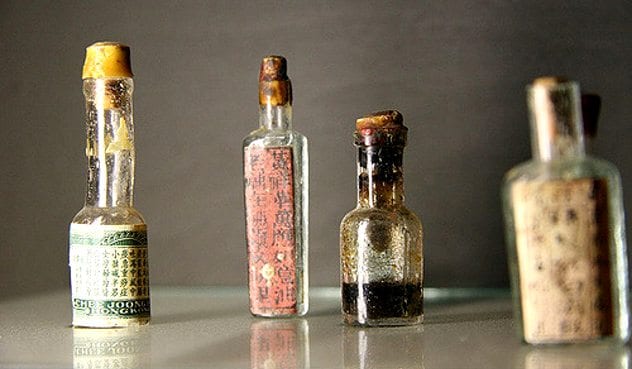
Xu Fu never delivered the elixir of immortality, but Qin Shi Huang did not give up. He had his alchemists make him every medicine they could to keep him healthy and alive, and he drank everything they told him would work—including a bottle full of mercury.
Qin Shi Huang was making a tour around his kingdom when the mercury killed him. He had brought a vial of it with him, which his court doctors had assured him was an “immortal medicine.” Instead, though, it cut his life short, killing him when he was only 49 years old.
Qin Shi Huang was a two-month journey away from home, and his chancellors were afraid about what might happen when the people found out he was dead. His advisor, Li Si, was determined to hide that the emperor had died. For the next few months, he pretended Qin Shi Huang was still alive, sending out orders of his own that he claimed came from the emperor.
Meanwhile, the immortal emperor’s dead body was sent home, flanked by carts full of rotting fish to hide the smell of his decaying remains.
2He Tried to Become The God-Ruler Of Hell
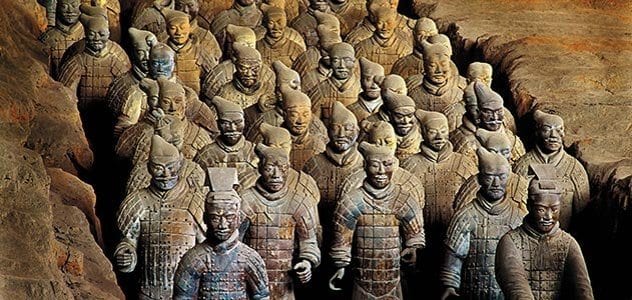
If Qin Shi Huang could not be immortal, he was not going to accept being a peasant in hell. He was determined to become the ruler of the afterlife, and he got ready for it.
Before he even became the emperor, he had started work on his tomb. By the time he died, he had forced 700,000 enslaved laborers to work on it. His tomb was incredible. It had replicas of his palaces and towers, flowing rivers of mercury, and a ceiling full of jewels that recreate the night sky.
And it had the Terracotta Warriors. Qin Shi Huang believed that, when he died, the six states he had defeated would rise up against him in the afterlife. And so he had his army remade out of terracotta to protect him in hell and help him conquer the world of the dead.
Traps were set up to keep anyone from getting in and disturbing the emperor’s resting place. The tomb was buried and seeded with grass and trees to keep anyone from ever finding it. And, to make sure that no one would ever find it, the workers who made it were forced to seal themselves in and die with the emperor inside his tomb.
1He Did Not Choose a Successor
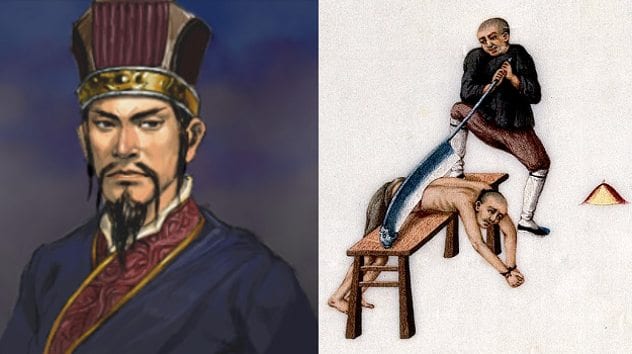
Qin Shi Huang had not planned on dying. He did not even like to think about it—and so he never sat down and wrote a will. He was determined, after all, to live forever, and so he saw no need.
With no will, it was not clear who was to take the throne, and the nation soon erupted into chaos. His eldest son Fusu was the obvious choice, but Qin Shi Huang’s advisor, Li Si, did not trust him. To keep Fusu out, Li Si forged a fake order declaring the second son, Huhai, the new emperor. Then he forged another, ordering Fusu to commit suicide.
The boys obeyed the orders they believed came from their father, and Huhai became the second emperor of China. His reign did not last long. Li Si and his co-conspirators soon turned against each other, and one had Li Si arrested and executed.
Li Si’s death was horrible. His nose, hands, feet, and genitals were chopped off, one-by-one, before he was finally cut in half down the waist. Then every member of his extended family, down to the third generation, was executed. Without Li Si, Huhai was unable to stop his people from rebelling, and he was soon overthrown.
In life, Qin Shi Huang had insisted that his dynasty would rule over China for 10,000 generations—but, after his death, it did not even last three years.
Mark Oliver is a regular contributor to Listverse. He writing also appears on a number of other sites, including The Onion’s StarWipe and Cracked.com. His website is regularly updated with everything he writes.
